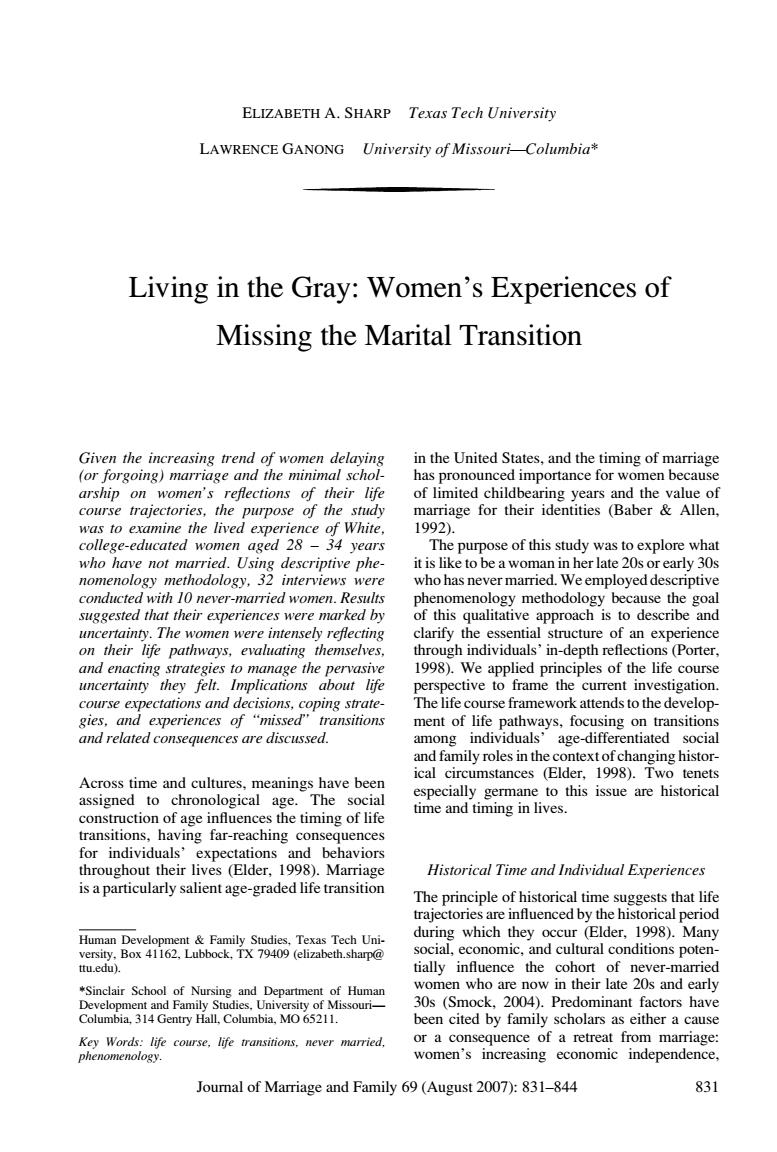正在加载图片...

ELIZABETH A.SHARP Texas Tech University LAWRENCE GANONG University of Missouri-Columbia* Living in the Gray:Women's Experiences of Missing the Marital Transition Given the increasing trend of women delaying in the United States,and the timing of marriage (or forgoing)marriage and the minimal schol- has pronounced importance for women because arship on women's refections of their life of limited childbearing years and the value of course trajectories,the purpose of the study marriage for their identities (Baber Allen, was to examine the lived experience of White, 1992). college-educated women aged 28-34 years The purpose of this study was to explore what who have not married.Using descriptive phe- it is like to be a woman in her late 20s or early 30s nomenology methodology,32 interviews were who has never married.We employed descriptive conducted with 10 never-married women.Results phenomenology methodology because the goal suggested that their experiences were marked by of this qualitative approach is to describe and uncertainty.The women were intensely reflecting clarify the essential structure of an experience on their life pathways,evaluating themselves, through individuals'in-depth reflections(Porter, and enacting strategies to manage the pervasive 1998).We applied principles of the life course uncertainty they felt.Implications about life perspective to frame the current investigation. course expectations and decisions,coping strate- The life course framework attends to the develop- gies,and experiences of "missed'transitions ment of life pathways,focusing on transitions and related consequences are discussed. among individuals'age-differentiated social and family roles in the context of changing histor- ical circumstances (Elder,1998).Two tenets Across time and cultures,meanings have been assigned to chronological age.The social especially germane to this issue are historical construction of age influences the timing of life time and timing in lives. transitions,having far-reaching consequences for individuals'expectations and behaviors throughout their lives (Elder,1998).Marriage Historical Time and Individual Experiences is a particularly salient age-graded life transition The principle of historical time suggests that life trajectories are influenced by the historical period Human Development Family Studies,Texas Tech Uni- during which they occur (Elder,1998).Many versity.Box 41162,Lubbock,TX 79409(elizabeth.sharp@ social,economic,and cultural conditions poten- ttu.edu). tially influence the cohort of never-married *Sinclair School of Nursing and Department of Human women who are now in their late 20s and early Development and Family Studies.University of Missouri- 30s (Smock,2004).Predominant factors have Columbia,314 Gentry Hall,Columbia,MO 65211. been cited by family scholars as either a cause Key Words:life course,life transitions,never married, or a consequence of a retreat from marriage: phenomenology. women's increasing economic independence, Journal of Marriage and Family 69(August 2007):831-844 831ELIZABETH A. SHARP Texas Tech University LAWRENCE GANONG University of Missouri—Columbia* Living in the Gray: Women’s Experiences of Missing the Marital Transition Given the increasing trend of women delaying (or forgoing) marriage and the minimal scholarship on women’s reflections of their life course trajectories, the purpose of the study was to examine the lived experience of White, college-educated women aged 28 – 34 years who have not married. Using descriptive phenomenology methodology, 32 interviews were conducted with 10 never-married women. Results suggested that their experiences were marked by uncertainty. The women were intensely reflecting on their life pathways, evaluating themselves, and enacting strategies to manage the pervasive uncertainty they felt. Implications about life course expectations and decisions, coping strategies, and experiences of ‘‘missed’’ transitions and related consequences are discussed. Across time and cultures, meanings have been assigned to chronological age. The social construction of age influences the timing of life transitions, having far-reaching consequences for individuals’ expectations and behaviors throughout their lives (Elder, 1998). Marriage is a particularly salient age-graded life transition in the United States, and the timing of marriage has pronounced importance for women because of limited childbearing years and the value of marriage for their identities (Baber & Allen, 1992). The purpose of this study was to explore what it is like to be a woman in her late 20s or early 30s who has never married. We employed descriptive phenomenology methodology because the goal of this qualitative approach is to describe and clarify the essential structure of an experience through individuals’ in-depth reflections (Porter, 1998). We applied principles of the life course perspective to frame the current investigation. The life course framework attends to the development of life pathways, focusing on transitions among individuals’ age-differentiated social and family roles in the context of changing historical circumstances (Elder, 1998). Two tenets especially germane to this issue are historical time and timing in lives. Historical Time and Individual Experiences The principle of historical time suggests that life trajectories are influenced by the historical period during which they occur (Elder, 1998). Many social, economic, and cultural conditions potentially influence the cohort of never-married women who are now in their late 20s and early 30s (Smock, 2004). Predominant factors have been cited by family scholars as either a cause or a consequence of a retreat from marriage: women’s increasing economic independence, Human Development & Family Studies, Texas Tech University, Box 41162, Lubbock, TX 79409 (elizabeth.sharp@ ttu.edu). *Sinclair School of Nursing and Department of Human Development and Family Studies, University of Missouri— Columbia, 314 Gentry Hall, Columbia, MO 65211. Key Words: life course, life transitions, never married, phenomenology. Journal of Marriage and Family 69 (August 2007): 831–844 831